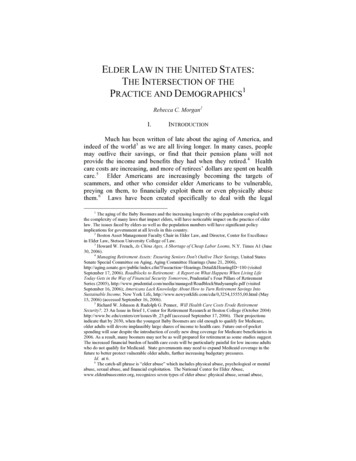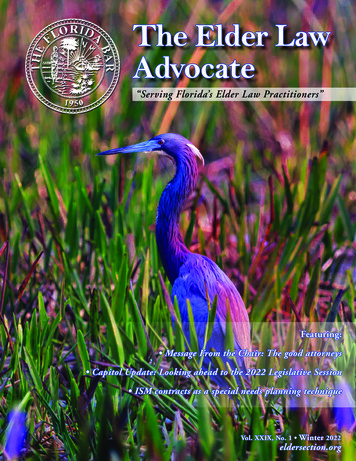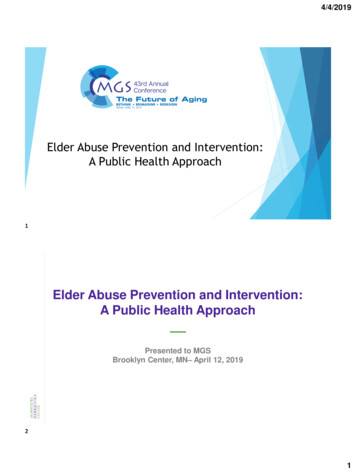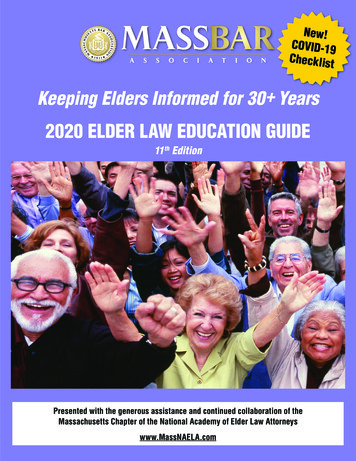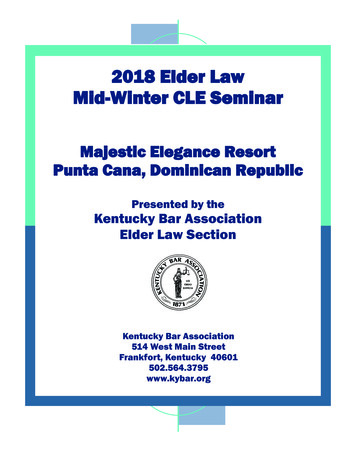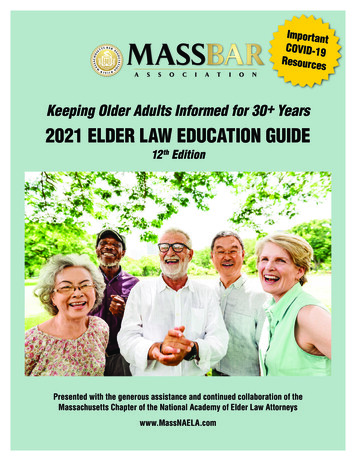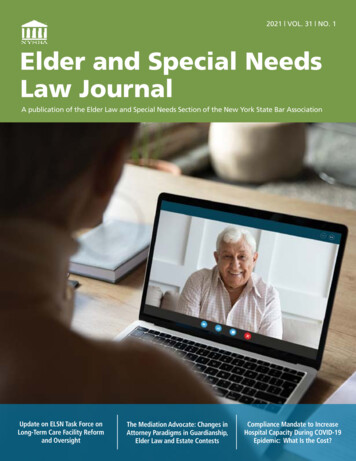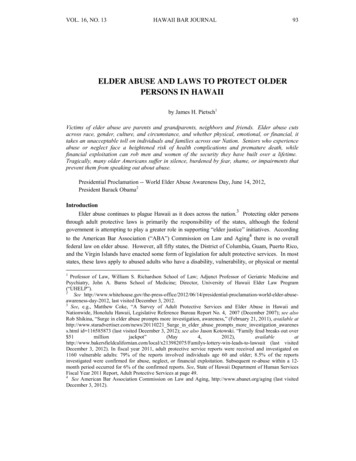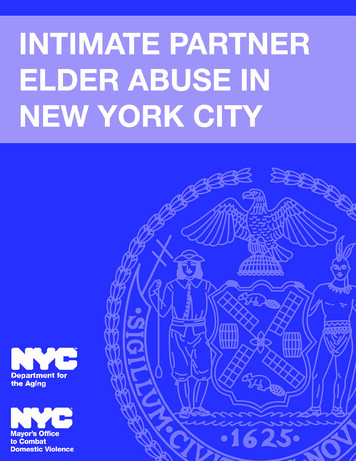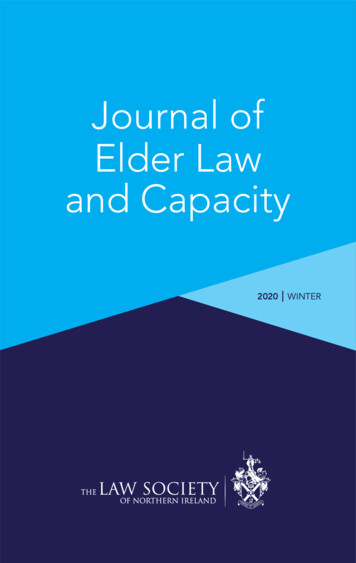
Transcription
Journal ofElder Lawand Capacity2020I WINTER
Journal ofElder Lawand CapacityEditorial PanelLinda Johnston,(Chair), TEP, Solicitor, Francis Hanna and CompanyDr Barbara English,Consultant in Old Age PsychiatryMichael Graham,TEP, Solicitor, Cleaver Fulton RankinSheena Grattan,TEP, BarristerAndrew Kirkpatrick,TEP, Solicitor, Murray Kelly MooreGarrett McCann,Solicitor, DA MartinHeather Semple(Editor), Librarian, Law Society of Northern Ireland
iInformationContentsContentsiiArticlesAdvance directives: quality of life versus sanctity of life?Linda Johnston1Discretionary variation – the use of the variation of trusts regime12to substitute discretionary disabled person’s trusts for fixed provisionWilliam GowdyBest interests, wishes and feelings and the Court of Protection2015 – 2020Alex Ruck Keene31The Solicitor Executor: some reflections from practice and somepitfalls [Part one]Sheena Grattan54Revisiting decision-making: a new case for legislation?Professor John Williams64Easy Read – supportive decision making and EasyRead Guidesfor solicitorsCaroline Bielenska81A Miscellany of Book reviews – Part 2Sheena Grattan88CasenotesSamantha Jones, Rachel Sullivan and Rosie Scott (39 Essex Chambers)Andrew Kirkpatrick, TEP, Solicitor, Murray Kellly Moore91Tables and Index108
iiInformationThe Journal of Elder Law and Capacity is a source of information for arange of practitioners dealing in all aspects of elder law and capacity.Published by the Law Society of Northern Ireland, it aims to have UK andinternational appeal with coverage on legal issues relevant to elder clients,clients with capacity issues, their families and carers.Submissions of contentWe welcome the submission of articlesfor the consideration by the EditorialPanel with a view to publication.Authors are asked to contact theeditor heather.semple@lawsoc-ni.org toobtain a style sheet.Submission of an article will be heldto imply that it contains originalunpublished work and is not beingsubmitted for publication elsewhere.All contributions must be sent at theauthor’s risk. Please note that wherethere are references to websites, thesesites were live at the time of writing.ISSN 2632-3923DisclaimerThe Law Society of Northern Ireland acceptsno responsibility for the accuracy of thecontents of the Journal and any views andopinions expressed in the Journal are thoseof the contributors and are not necessarilythose of the Law Society of Northern Ireland,save where otherwise indicated. Although allreasonable care is taken in the preparationof material for publication in the JournalEditorial Panel, publishers and contributorsaccept no responsibility for any loss causedto any person acting or refraining fromacting as a result of material contained in oromitted from the Journal. The Journal is nota substitute for professional advice. Readersshould satisfy themselves as to the accuracy,completeness, adequacy and currency of thecontents of the Journal. Law Society of Northern Ireland 2021.All rights reserved. No part of this publicationmay be reproduced or transmitted inany form or by any means electronic ormechanical, including photocopying,recording of any retrieval system, withoutthe written permission of the Law Society ofNorthern Ireland.Published by the Law Society of NorthernIreland, 96 Victoria Street, Belfast BT1 3GN
Linda Johnston, TEP, SolicitorFrancis Hanna and Co.In this article Linda Johnston outlines the purpose and practicalitiesof drawing up an Advance Directive, and provides guidance on how toensure it has the desired result.IntroductionAdvance Directives are effectively medical choices, made in advance, on a“just in case” basis. Confusingly they have accumulated a number of titlesand may be known to many as “Living Wills”. In reality they are about dyingrather than living and they speak about medical matters, not property andassets. For this reason, my preference is the term “Advance Directive”.They remain uncommon and many practitioners will never have seen oneor have been asked to draft one. Yet, in essence, they are straightforwardin language and intent, and there is no doubt they are legally enforceable.In Northern Ireland we rely on the common law to give legal effect to anAdvance Directive whereas other jurisdictions have placed such directiveson a statutory footing as in England and Wales under the Mental CapacityAct 2005.The seminal case remains Airedale NHS Trust -v- Bland [1993] 1 ALL ER 821.This case arose out of injuries sustained by a young man at the HillsboroughStadium tragedy. Whilst he did not have an Advance Directive (and theissue before the Law Lords was whether life-sustaining treatment couldbe withdrawn as his family requested), the Law Lords took the opportunityto consider in-depth the legal implications of a person’s right to withholdconsent to life-prolonging treatment with particular regard to personsno longer able to give or withhold their consent. This led to the settingup of a House of Lords Select Committee on Medical Ethics which in turnled to various developments including the publication by the BritishMedical Association of Advance Statements About Medical TreatmentCode of Practice, published in 1995. In the introduction to that Code it isacknowledged that there are both benefits and dangers to making treatmentArticlesAdvance Directives: quality oflife versus sanctity of life?1
2Articlesdecisions in advance. The view is expressed that health professionals andpatients should be aware of both.“ Nevertheless, carefully discussed Advance Statements have an importantplace in the development of a genuinely more balanced partnershipbetween patients and health professionals. The Code considers theimportance of Advance Statements as well as the refinement of anAdvance Statement to an Advance Directive which has directive force andwhich almost always would amount to a refusal of medical treatment.”Typical clientsIn my experience, clients seeking advice on Advance Directives fall intothree categories;1. Clients with a specific diagnosis which may be a terminal illness ora diagnosis of a long-term debilitating medical condition throughwhich they anticipate losing the ability to communicate and/ortheir mental capacity.2. Clients who have watched and, most probably, cared for a lovedone who, over an extended period of time endured debilitatingand diminishing health conditions which they would not wish toendure themselves. These clients in particular will have seriouslyconsidered if life must have some perceptible quality to be valuable.3. Clients who have no specific anticipation of illness, but arethoughtful forward planners, and are keen to put their affairs inorder. Typically they will be reviewing or making a new Will andconsidering an Enduring Power of Attorney at the same time.Undoubtedly, the most difficult conversations are likely to arise withthe first category of patients who are actively preparing for a distressingfuture. However, with serious and predictable medical conditions such asMotor Neurone Disease, one tends to find that a Consultant would at leastunderstand and most likely positively engage with their patient in discussingthe development of their illness and if and when a patient may no longerwish to be treated. In this situation the lawyer will have the benefit of muchmore specific guidance from the client via the Consultant as to the particularmedical conditions likely to develop and that can be specifically identified inan Advance Directive.
Terminology“ An Intensivist who reported feeling “bullied” into acting against his betterjudgement by the legalistic tone of these documents said that he would bemore likely to do as the documents requested if patients used the words“please” and “thank you”.A participating retired GP, recognising that doctors are sometimesantagonised by what they experience as legal coercion used in an attemptto override their clinical judgement, had written his own Advance Directivein deliberately personal language.Reflecting on these reactions and the continued conundrum as to whylawyers and doctors too often seem to be facing in opposite directions, Ihave changed my practice to encourage clients to personalise their AdvanceDirectives. Whilst I still seek to identify specific medical circumstances, I alsoencourage clients to express in broad terms deeply held values and beliefs.Professor Kitzinger makes the very practical point that if the intention is tomake an Advance Directive effective then it needs to be written in termswhich speak to the people responsible for honouring its terms, typically arefusal of treatment.There are many available legal precedents to refer to. In particular, I havefound the various editions of 'Elderly Clients Precedent Manual' particularlyhelpful.2 Additionally, charities also provide a lot of information anddirection. The first template I saw many years ago was from the TerenceHiggins Trust. Interestingly, it now seems to offer those enquiring a link toCompassion in Dying, as does the NHS website page on Advance Decision(Living Will). Note however that these organisations focus particularly on ance-Decisions-Do-they-work-523258.pdf Bielanska: Elderly clients: a precedent manual. 5th edition, Jordans, 2016.12ArticlesIncreasingly I have become aware of the importance of appreciating medicalterminology. When I first became interested in this area of law many yearsago, I felt one of the most important points to grasp was the need for certaintyand clarity in the drafting of an Advance Directive. Experience has taughtme that there is a tension between this approach, and the extent of medicalknowledge which lawyers have as to the implications of certain medicaldescriptions. Research has suggested that some medical practitioners maybalk at what they deem to be overly directive language. Professional CeliaKitzinger1, in research conducted with the York – Cardiff Chronic DisordersConsciousness Research Centre, reflected on the reactions of consultantsand GPs to a set of 8 different Advance Directives and commented :-3
4Articlesthe position in England and Wales where Advance Directives are now ona statutory footing as a result of the Mental Capacity Act 2005. That aside,there is a lot of very useful guidance and assistance, particularly withexplanations of key medical words or phrases which lawyers and laypeoplemay not fully appreciate in the medical context. For example, all clients Ihave spoken to about Advance Directives are keen not to be sustained in apermanent vegetative state. Do they however appreciate that a diagnosisof “permanent vegetative state” may mean waiting six months after a nontraumatic injury or a year after a traumatic injury for such a diagnosis to beconfirmed? The refusal of life-sustaining treatment to a medical practitionerwould include; Ventilation – which may be used if one cannot breathe for oneself.Cardio Pulmonary Resuscitation (CPR)Antibiotics – which can help your body fight infection.I suspect many people would not consider antibiotics as “life sustainingtreatment”, thinking more readily of aggressive invasive intrusive treatmentsuch as CPR.Clients should always be advised to discuss the terms of their AdvanceDirective with a doctor and, if possible, a specific medical practitionertreating a particular condition which causes them concern. The examplesabove illustrate the opportunities for misunderstanding in the interpretationof language between a medical practitioner and layperson. When I havesettled the terms of an Advance Directive with a client I advise that theydiscuss it with their doctor before signing, and come back to me withany queries raised. This has the double effect of ensuring that the clientfully appreciates how a medical practitioner would interpret the AdvanceDirective and also generates a medical record of the client’s engagementand understanding as to the Direction being given.Drafting the Advance DirectiveA mentally capable adult can make an Advance Directive. The client makingthe Advance Directive (P) sets out circumstances in which treatment isrefused. P cannot use an Advance Directive to require treatment tobe undertaken. P must be able to understand, retain and weigh theinformation relevant to their decision and communicate such decision.Drafting Guidance:The following should be noted when drafting the Advance Directive:
It is strongly advised that the Directive is in writing, as one would notwish to rely on an oral directive unless in exceptional circumstances.In jurisdictions where Advance Directives are on a statutory footing,one would anticipate a statutory requirement that they are inwriting. In the case of HE V A Hospital, Munby J, as he then was(prior to Mental Capacity Act 2005), summarised the position inEngland when making it clear that whether there is a continuingvalid Directive is a matter of fact and the burden of proof is on thosewho seek to establish the existence and continuing validity andapplicability of the Advance Directive;“Where life is at stake, evidence must be scrutinized with specialcare. Clear and convincing proof must be clearly established byconvincing and reliable evidence. If there is doubt, that doubt fallsto be resolved in favour of the preservation of life”.2. The nature of the document should be identified with the heading“Advance Directive”.3. The name, address and date of birth of P should be stated.4. The document should be dated.5. The medical circumstances which would trigger the operation ofthe Advance Directive, should be specified.6. The nature of the treatment refused should be set out.7. A brief expression of P’s values may be useful. This may include areference to quality of life versus sanctity of life.8. A request that any doctor or nurse with a conscientious objectionto the operation of the Advance Directive transfer P’s care to othermedical practitioners may be valuable.9. A revocation of earlier wishes, if relevant.10. A signature clause, including provision for at least one witness.5Articles1. There is no prescribed form for an Advance Directive in NorthernIreland. [See precedent on pages 10 and 11.]
6To be effective, an Advance Directive must :Articles be available when the relevant circumstances arise;be relevant to the condition in hand;clearly reflect P’s wishes.As there is no central registrar of Advance Directives, it is essential to highlightto a client the importance of ensuring the document can be produced whenneeded. This may seem obvious but often it is not appreciated. Time willoften be of the essence, and P’s nearest and dearest, whether friends orfamily, need to have a copy of the Directive to be able to produce it whenneeded. Otherwise it has no value.My own practice is to advise my client to ensure copies are with the following: their GP notes and records; any current treating Consultant in respect of which it may berelevant; several close family members or friends who are likely to be at P’sbedside in the event of a medical emergency or profound illness.Typically we hold original Advance Directives in our strong room providingclients with certified copies to give to their key relatives or friends.A client should also be advised that they should retain a record of the peoplewho have a copy of the Advance Directive, should they wish to revoke theDirective or revise it. The custodians of the original Advance Directive wouldobviously have to be notified in such circumstances to avoid any doubt ormisunderstanding.All is not lostHowever much thought and care is given by the person expressing choicethrough their Advanced Directive, and any advisor assisting, one cannotcover all eventualities. Clearly the advice must be to frequently review,and if necessary, update Advance Directives, but in reality we know goodintentions are not always acted on. If a medical situation arises which wasunforeseen and not covered by the specific terms of an Advance Directive,the fact that a Patient had taken time to deliberate on end of life issues andexpress wishes can provide extremely valuable guidance to a medical teamand, if in doubt, to a Court.In Westminster City Council -v- Manuela Sykes [2014] EWHCb B9 (COP), althoughthe terms of an Advance Directive written by the Patient were not strictly
“The existence and terms of the Living Will are relevant to the Court’sconsideration of her best interest. This is because it is an expression of herwishes, feelings, beliefs and values made by her when she had capacity.The document indicates in general terms that she prioritises quality of lifeover prolongation of life.”I witnessed a similar situation which thankfully did not require Courtdirection as the Patient remained mentally capable, but struggled to beheard.Richard’s StoryOver 20 years ago I acted for Richard, a very intelligent 75-year-old retiredlecturer who was profoundly angry and at odds with the hand he had beendealt in later life. He had been a strident independent individual who hadbecome almost entirely dependent on teams of carers and consideredhimself a prisoner in his own home as a result of his diagnosis of MultipleSclerosis. Friends had drifted away exhausted by his moods and cantankerousbehaviour. I am confident he had tried to commit suicide on more than oneoccasion but “the damned illness” meant he was mechanically unable to dothe deed.We wrote an Advance Directive together. He waited and hoped a medicalcondition would develop which left untreated would cause his death. Ayear later a carer phoned me to let me know he was in hospital and wantedto see me. He had respiratory problems and additionally had contracted achest infection. It was treatable - however when he refused treatment hewas ignored and I was called. The Advance Directive we had written did notapply. The terms did not cover the medical condition prevailing at the timeand in any event he was still mentally capable and able to make treatmentchoices, albeit he was being disregarded. Explaining why I wished to speakto his treating Consultant it became clear that the nursing staff at that timedid not know what an Advance Directive was. Ultimately the Consultanttalked with me, read the Advance Directive, and began to appreciateRichard’s often expressed wish that his life would end and he would be freeof the “damned illness”.I watched from a distance as the Consultant gathered a medical team aroundRichard’s bed and outlined the treatment he proposed. He was now listeningrespectfully to the grumpy septegenarian when he declined medicalintervention. Richard was kept comfortable and hydrated until his deathfour days later. Without the Advance Directive, I have no doubt Richard’s7Articlesapplicable to her current condition, the views expressed in it were used withother evidence to rule in her favour with the Judge commenting:
8Articlesdetermination not to be treated would have been ignored and with it, hisautonomy denied as the medical team, with every good intention wouldhave engaged in treatment they considered to be in his “best interests”.The significant legislative changes in the area of mental capacity introducedacross the various jurisdictions of the United Kingdom in the last 20 yearsall have as a central principle the aim to respect and support the decisionsof incapacitated adults about their own lives. Whilst the right to make anAdvance Directive and for this to be honoured predated this legislation,“the right to choose” as referred to by Lord Donaldson in Re T (Adult:- refusalof treatment) [1992] 4 ALL ER 649 is more widely appreciated and acceptedthan it was at that time. In his words; “Prima facie every adult has a right and a capacity to decide whether ornot he will accept medical treatment even if a refusal may risk permanentinjury to his health or even lead to premature death. Furthermore, itmatters not whether the reasons for the refusal were rational or irrational,unknown or even non-existent. This is so notwithstanding the very strongpublic interest in preserving the life and health of all citizens.”ReflectionsAs a much younger practitioner I tended to view Advance Directivesas choices made in advance, in the event of a traumatic injury or for theminority living with a daunting medical diagnosis due to a degenerativedisease. As the years have passed and I have aged, my perspective haschanged. Each generation is living longer than the last but for increasingnumbers of the population there are questions about quality of life. Manymore people are kept alive by advances in medicine and an expectation ofmedical intervention. There are many ethical and social debates to be hadin this area. We live in an age where individualism and personal rights arestrongly advocated. The ability to make choices at the end of one’s life incertain circumstances is entirely consistent with our rights-based society.Advance Directives are not about extending life or hastening death, they areabout respecting choice.Choice is also something that may be exercised by some practitioners whoprefer not to become involved in this area of work if they place the sanctityof life above personal choice. Some may draw a parallel to the ethical choicegiven to doctors in relation to abortion. Given that the exercise of one’schoice through an Advance Directive is a legally recognised right, I wouldurge such practitioners to not simply decline, but to refer clients elsewhereor least make them aware of the opportunity to put an Advance Directivein place.
Through writing this piece, I have finally worked through my own AdvanceDirective, which has been on the To-Do list for many years. It is largely in theform of the draft (shown on pages 10 and 11) simply as an example to thosewho may not have seen an Advance Directive, but it is shared without anyencouragement or recommendation.9ArticlesAs practitioners dealing in Elder Law and Capacity issues, the spectre ofundue influence and the alarming vulnerability of clients with capacityissues dependent on others who may not be entirely wholesome, doescause concern. However, I have yet to meet a client who wanted to talkto me about an Advance Directive who was anything other than clear anddetermined about their wishes. On the contrary, my experience has beenthat these clients are focused and do not cause me concern in relationto capacity. I suspect that vulnerable adults who could be encouragedto commit to an Advance Directive without properly appreciating itsimplications will be invisible to the legal profession. Unfortunately, thevulnerability of such clients will probably be even greater in relation to theirfinances than their end of life choices.
10ArticlesPRECEDENT FORM OF AN ADVANCE DIRECTICEI name and address make this Advance Directive after much thought andconsideration over a period of years.I have not been influenced by any single event or anyone in the making ofthis Directive.I am making and expressing my decision to refuse certain medical treatmentsin the event that the state of my health means I cannot have a meaningfulquality of life and can no longer express wishes through mental incapacityat a later date.I have discussed my wishes with my nearest relatives, my . andmy . I am confident that they will respect my medical wishes and I ask thatthose responsible for my medical care do likewise. If any of the medicallyqualified persons treating me are unwilling to comply with my wishes dueto a conscientious objection, I request that they take steps to transfer mycare to other suitably qualified persons who will respect my wishes. I do notconsider that the sanctity of life is paramount. I believe that I have the rightto make choices as to my medical care.I refuse life sustaining treatment if any of the Medical Circumstances set outbelow affect me, even if my life is at risk and may be shortened as a result.When I say I refuse life-sustaining treatment I mean: Cardiopulmonary Resuscitation (CPR).mechanical or artificial ventilation.clinical assisted nutrition or hydration.but I do consent to being fed orally and to any treatment which may relievepain or be considered necessary for the health and safety and protection ofothers.Medical Circumstances1. I am suffering from severe Dementia and for example some or all of thefollowing apply: I do not recognise my family and friends.I am unable to have a meaningful conversation.I cannot feed myself.I no longer have bladder and bowel control.I need to be cared for day and night.
I have a brain injury as a result of which I am in a minimally consciousstate or vegetative state and I am unlikely to regain the ability to makean informed medical decision.3.I have a disease of the central nervous system causing damage to thecells of the brain or spinal cord and I cannot make and communicatedecisions about my medical treatment and I am unlikely to regain theability to do so.4.I have terminal cancer and I am unable to make or communicatedecisions about my medical treatment and I am unlikely to regain theability to do so.5.Any other medical condition from which I am unlikely to regain theability to make and communicate a medical decision which rendersme: persistently unaware of my surroundings, and/orpersistently unable to recognise friends and family, and/orpersistently anxious or agitated.I do not consent to my organs being used for transplantation orexperimentation.If any part of this Advance Directive is invalid or unenforceable it can besevered from the parts which are lawfully valid and enforceable.I am well aware of the implications of the Statement I am making and thedecision to refuse treatment in certain circumstances having discussedthese implications with a Medical Practitioner.I have asked my GP to place a copy of this Advance Directive with mymedical notes.Signed .Date Witness ( name and address)11Articles2.
12ArticlesDiscretionary Variation: The useof the variation of trusts regimeto substitute discretionarydisabled persons’ trusts for fixedprovisionWilliam T Gowdy, M.A. (Oxon), T.E.P., QC1This article reviews the conditions involved in the Court’s jurisdiction tovary trusts for the benefit of a person who lacks capacity, and considersthe circumstances in which those conditions will allow the substitutionof discretionary trust provision in place of vested interests.IntroductionPractitioners acting in the sphere of property and capacity will oftenencounter the difficult scenario where a well-meaning relative has soughtto make trust provision for a disabled person, but has done so in a mannerwhich is far from ideal. Scenarios encountered include the grant of a lifetimeinterest, which produces a negligible income in current conditions, or a giftof capital to someone entitled to means-tested benefits. Such a gift maydeprive the beneficiary of his or her entitlement to means-tested benefits,such that the capital is exhausted in replacing the benefits income, and sodoes not serve to make extra provision for the beneficiary.These difficulties are compounded when the beneficiary lacks capacity.A beneficiary with capacity can require the termination of the trust,2 orcan enter into a deed of variation of a will, but a beneficiary who lackscapacity cannot do so. In many jurisdictions which recognise trusts, there islegislation3 which addresses this issue, by empowering the Court to grant itsconsent to the revocation or variation of a trust on behalf of certain persons,including those who lack capacity.Bar Library, Belfast. If he or she joins with all other beneficiaries in requiring that termination under the Rule inSaunders v Vautier (1841) 4 Beav 115.3 In Northern Ireland, section 57 of the Trustee Act (NI) 1958. This provision corresponds tothe Variation of Trusts Act 1958 in England and Wales.12
The variation of trusts regimeThe statutory provision empowering the court to vary trusts is section 57of the Trustee Act (NI) 1958. Such a statutory provision was necessary inlight of the decision of the House of Lords in Chapman v Chapman6 whichidentified clear limits on the Court’s equitable power to authorise a variationof a trust. The Court had no equitable power to sanction a variation of atrust simply where that variation was to the benefit of an infant beneficiarywho could not give his own consent. The equitable power was limited toauthorising a variation by way of a compromise to a genuine dispute aboutthe terms of the trust, or to sanctioning a variation where it was needed byway of “salvage” to respond to a real and unforeseen emergency.7Section 57(1) of the Trustee Act (NI) 1958 provides that: “ where property is held on any trusts or settlements arising underany will, settlement or other disposition, the court may if it thinks fitby order approve on behalf of [various classes of person,8 includinga person who as a result of mental incapacity is unable to assent]any arrangement varying or revoking all or any of the trusts or I.e. provision under a discretionary trust where the beneficiary does not have a fixedentitlement to income or to capital, but where the trustees have power to pay income tothe beneficiary and to advance capital to him or her. The trust fund will not be treated aspart of the beneficiaries resources in assessing the beneficiary’s entitlement to meanstested benefits, only the income actually paid to the beneficiary or the capital advanced tohim.5 Such as a disabled person’s trust recognised under section 89 of the Inheritance Tax Act1984.6 [1954] AC 429.7 Such as consenting to a Scheme of Arrangement for shares in a trading company held intrust: Re New [1901] 2 Ch 534, or an increase in capital or maintenance provision for aninfant beneficiary where the provision which had been made turned out to be inadequate:Re Tollemache [1903] 1 Ch 457, Re Walker [1901] 1 Ch 879.8 These are: a) any person having, directly or indirectly,
The Journal of Elder Law and Capacity is a source of information for a range of practitioners dealing in all aspects of elder law and capacity. Published by the Law Society of Northern Ireland, it aims to have UK and international appeal with coverage on legal issues relevant to elder clients, clients with capacity issues, their families and .
